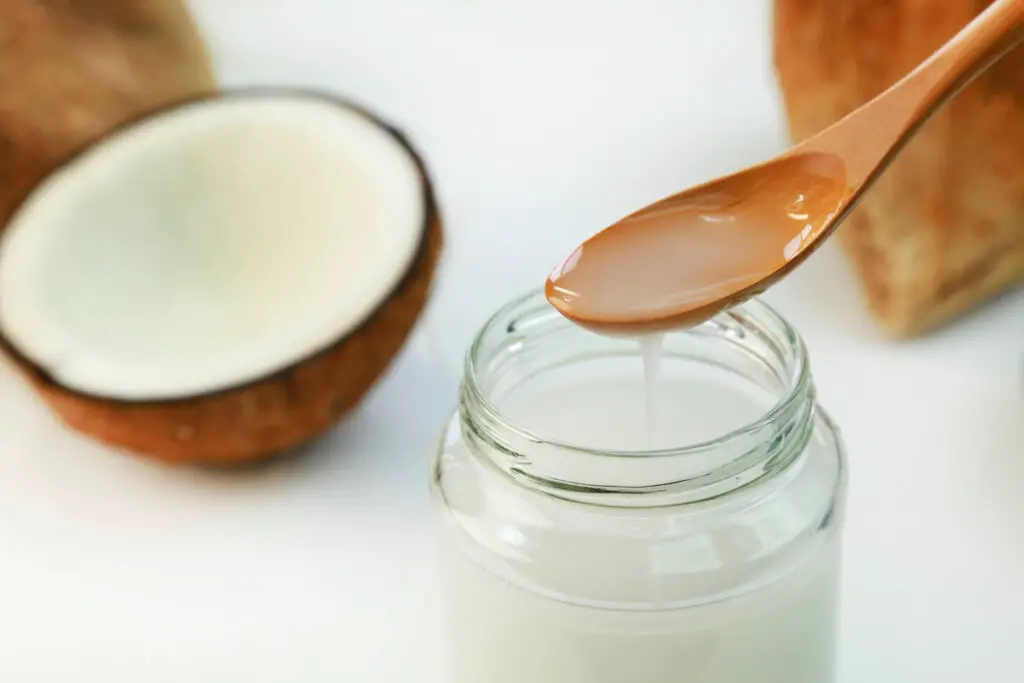
If you have a dry, flaky nose and are looking for an all-natural remedy, then coconut oil may be the answer.
Coconut oil is a versatile product that can help alleviate the discomfort of a dry nose as well as provide other benefits such as helping to protect and nourish your skin.
Let’s take a look at how you can use coconut oil for dry nose and about its benefits and precautions.
Contents
- 1 How to Use Coconut Oil for Dry Nose?
- 2 Benefits of Using Coconut Oil for Dry Nose:
- 3 Precautions While Using Coconut Oil for Dry Nose
- 4 What Is the Fastest Way to Heal a Dry Nose With Coconut Oil?
- 5 Can I Put Coconut Oil On Dry Nose Daily?
- 6 How Do You Oil Pull Your Nose?
- 7 Does Coconut Oil Help With Mucus?
- 8 Is Coconut Oil Good for the Sinuses?
- 9 Conclusion:
How to Use Coconut Oil for Dry Nose?
Using coconut oil for dry nose is simple and straightforward. All you need is some organic coconut oil and a clean cotton swab or pad.
- Start by gently melting the coconut oil into liquid form using either your hands or warm water – but not too hot!
- Once melted, lightly dab the cotton swab or pad into the liquid and then apply it directly onto your nose.
- Gently rub it in using circular motions until all of the affected areas are covered, then let it sit for 10-15 minutes before rinsing off with lukewarm water.
- Repeat this process twice daily until you see results!
– Benefits of Coconut Oil on Skin
Coconut oil has long been known to have hydrating properties that make it ideal for treating dry noses.
Not only does it deeply moisturize the skin, but it also helps protect against further damage by creating a barrier against harsh elements.

The natural oils in coconut oil also help lock in moisture and reduce inflammation, which can cause irritation and soreness around the nasal area.
– Alternatives of Coconut Oil for Dry Nose
If you’re not interested in using coconut oil there are other alternatives that can help with dry noses as well!
- Aloe vera gel is another great option since it contains antibacterial properties that help fight bacteria while reducing inflammation and keeping your skin hydrated.
- Another great option is jojoba oil which is rich in Vitamin E and helps soothe irritated skin while providing deep hydration that lasts all day long!
Benefits of Using Coconut Oil for Dry Nose:
1. Coconut oil is a great moisturizer for dry noses because it is rich in fatty acids and contains medium-chain triglycerides that help to keep the nose hydrated and soft.
2. Coconut oil also has anti-inflammatory properties which can help reduce redness and irritation due to dryness which makes using coconut oil for dry nose a great choice.
3. Using coconut oil on a dry nose can help restore the skin’s natural protective barrier, preventing further damage due to dehydration.
4. Coconut oil can also act as an effective cleanser, removing dirt, excess sebum, and other impurities from the nasal area while not stripping away natural oils that are important for keeping the skin hydrated.
5. Applied topically, coconut oil can penetrate deeper into the skin than most creams or lotions, providing longer-lasting protection against dehydration and helping to maintain a healthy shine to the nose area.
Precautions While Using Coconut Oil for Dry Nose
Coconut oil is generally considered safe to use on the skin but it’s important to take a few precautions when using it directly on your nose.
- Make sure to test a small area of skin first before applying it all over, and avoid getting any in the eyes as this can cause irritation.
- Additionally, if you have allergies or are prone to breakouts, it’s best to speak with a doctor before using coconut oil as it may not be the best solution for your individual needs.
- Lastly, make sure to use only organic and pure coconut oil on dry nose in order to benefit from its moisturizing properties without any added chemicals or preservatives.
What Is the Fastest Way to Heal a Dry Nose With Coconut Oil?
For the fastest way to heal a dry nose with coconut oil, apply a thin layer of pure, organic coconut oil to the affected area twice daily.
- Massage it gently into the skin using light circular motions and let it sit for 10-15 minutes before rinsing off with lukewarm water. This process should be repeated until you notice a significant improvement in the condition of your skin.
- Additionally, it’s important to drink plenty of fluids and use a humidifier or vaporizer to keep your nasal passages moist throughout the day. This will help prevent further dehydration and speed up the healing process.
- Finally, be sure to use only organic coconut oil on the skin in order to reap the full benefits of its moisturizing properties.
Can I Put Coconut Oil On Dry Nose Daily?
Yes, you can put coconut oil on dry nose daily if you find that it’s helping to remedy dryness.
However, it’s important to note that applying too much or too often could irritate the skin and worsen the problem. It’s best to start with a small amount twice daily and then adjust the frequency of applications as needed.
Additionally, if you experience any itching or burning sensation when using coconut oil in your nose, discontinue use immediately and consult a doctor for further guidance.
How Do You Oil Pull Your Nose?
Oil pulling your nose is a simple method of detoxification that can help to remove impurities and nourish the skin in the nasal area.
- To oil pull your nose, simply take one teaspoon of coconut oil and swish it around in your mouth for 15-20 minutes while taking deep breaths through your nose.
- This helps spread the oil particles throughout the nasal cavity and throat, drawing out toxins while moisturizing the skin.
- When finished, spit out the oil and rinse your mouth with lukewarm water. This process can be repeated once or twice daily for the best results.
Does Coconut Oil Help With Mucus?
Yes, coconut oil can help with mucus in the nose. Its natural anti-inflammatory properties can help soothe irritation and reduce congestion, while its moisturizing benefits will help keep the nasal area healthy and hydrated.
Additionally, coconut oil contains lauric acid which has antiviral and antimicrobial properties that can disrupt the growth of bacteria in the nose and help to reduce mucus.
To use coconut oil for nasal congestion, simply massage a small amount directly onto the skin twice daily until the symptoms have cleared up. For best results, make sure to use only organic and pure coconut oil on the skin.
Is Coconut Oil Good for the Sinuses?
Undoubtedly, coconut oil has terrific advantages for the sinuses. Its remedial properties – antiviral, anti-inflammatory, and antibacterial can help lessen irritation in addition to reducing congestion in nasal passageways.
Moreover, its moisturizing effects will keep your sinus area hydrated while helping it heal faster from any problems that arise.
To see tangible results quickly, massage a thin layer of pure organic coconut oil onto the skin twice daily – this way you’ll be able to reduce inflammation quicker as well as fight infection resulting in healthy and clear sinuses!
Conclusion:
Using coconut oil for dry noses is a great way to get relief from uncomfortable symptoms without relying on expensive over-the-counter medications or creams.
It’s easy to use, affordable, and provides deep hydration that will last throughout the day – plus its natural ingredients make it safe enough to use every day without worry!
So if you’re looking for an all-natural remedy for dry noses, give coconut oil a try – your nose will thank you later!














